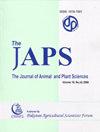ECONOMIC ANALYSES, INJURY LEVELS AND THRESHOLDS FOR EFFECTIVE MANAGEMENT OF EARIAS VITTELLA (FAB.) ON GOSSYPIUM HIRSUTUM
IF 0.5
4区 生物学
Q3 AGRICULTURE, MULTIDISCIPLINARY
引用次数: 0
Abstract
Spotted bollworm, Earias vittella Fab. (Lepidoptera: Noctuidae), is a serious insect pest of cotton that reduces crop yield and deteriorates lint quality. Field experiments were conducted at the Central Cotton Research Institute, Multan, Pakistan for two consecutive years (2009 and 2010) to estimate economic injury level (EIL) and economic threshold level (ETL). For economic analyses, gain threshold (GT) and benefit-cost ratio (BCR) were assessed by spraying cypermethrin, deltamethrin and spinosad at four thresholds levels (0, 3, 5 and 7% damage) and compared with unsprayed treatment (control) for a long and a short duration cotton genotype. The numbers of damaged fruits were almost similar while larval populations and the numbers of healthy fruits were different between the two genotypes. Insecticides applications at selected percent damage levels kept E. vittella larval infestation and bolls damage well below from the total fruit losses of 60-74% in unsprayed treatment. Increase in percent damage levels decreased the cost of protection (CP) and the net monetary profit (NMP). ETL for long duration genotype (CIM-496) is suggested at 5% damage level with a larval population of 1.12-1.22 larvae per 25 plants (GT basis) and 4.5 larvae per 25 plants (BCR basis). For short duration genotype (CIM-506), ETL at 3% damage level with larval population of 1.4-1.33 larvae per 25 plants and 3.3 to 3.9 larvae per 25 plants on GT and BCR basis, respectively is recommended. Timely application of insecticides at ETLs is suggested as economical mean for an effective control of E. vittella on cotton crop.经济分析、危害水平和阈值对有效管理的影响论绵棉
斑点棉铃虫,斑点棉铃虫。(鳞翅目:夜蛾科)是严重危害棉花的害虫,严重影响棉花产量和棉绒品质。在巴基斯坦木尔坦中央棉花研究所连续两年(2009年和2010年)进行了田间试验,以估算经济伤害水平(EIL)和经济阈值水平(ETL)。在经济分析方面,采用氯氰菊酯、溴氰菊酯和spinosad在4个阈值水平(危害0、3、5和7%)下对长、短持续期棉花进行喷施,并与未喷施(对照)进行比较,评估了收益阈值(GT)和效益成本比(BCR)。两种基因型的害果数量基本相同,而幼虫种群和健康果数量存在差异。在选定的危害百分比水平上施用杀虫剂,使维特拉螟幼虫侵染和棉铃损害远低于未施用杀虫剂的总果实损失60-74%。伤害等级百分比的增加降低了保护成本(CP)和净货币利润(NMP)。长生期基因型(cmm -496)的ETL建议在5%的危害水平下,每25株幼虫数量为1.12 ~ 1.22 (GT),每25株幼虫数量为4.5 (BCR)。对于短持续期基因型(cmm -506),建议在3%的危害水平下,以总生物量和总生物量分别为1.4 ~ 1.33只/ 25株和3.3 ~ 3.9只/ 25株。建议及时施用杀虫剂是有效防治棉田褐飞虱的经济手段。
本文章由计算机程序翻译,如有差异,请以英文原文为准。
求助全文
约1分钟内获得全文
求助全文
来源期刊

Journal of Animal and Plant Sciences
Multiple-
CiteScore
1.50
自引率
0.00%
发文量
128
审稿时长
6 months
期刊介绍:
The Journal of Animal and Plant Sciences (JAPS) is a bi-monthly publication and is being published regularly since 1991 by the Pakistan Agricultural Scientists Forum (PAS FORUM). It publishes original research papers, review, extension/clinical articles on all aspects of animal (including fisheries/wildlife) and plant sciences, agricultural economics, rural sociology and other related subjects. The journal is read, abstracted and indexed by the abstracting/indexing agencies of international repute.
 求助内容:
求助内容: 应助结果提醒方式:
应助结果提醒方式:


